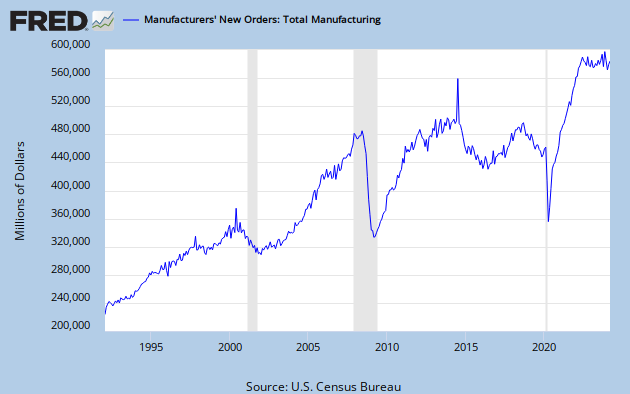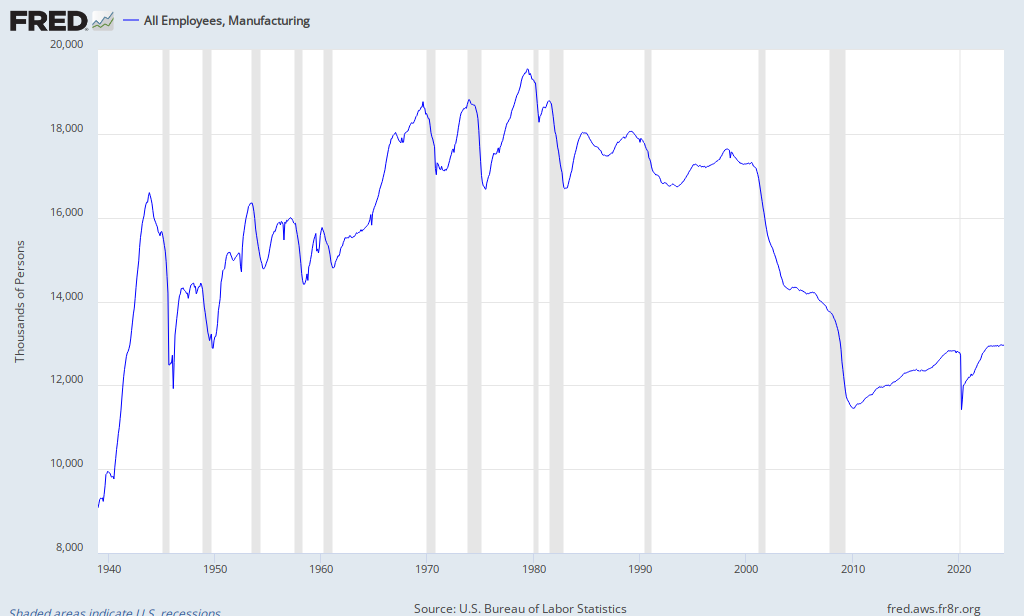Two years ago, I was at a board meeting for a nonprofit that I serve, and during a break, one of the older gentlemen made a statement that the big problem with America is that we don’t make anything anymore.? I suggested to him that many services enhance and replace the need for some goods.
Now, I don’t have a Facebook account, and I have no intent of getting one.? But I must have been thinking about Facebook as an investment, because I asked him, “What about something like Facebook then?? Doesn’t that have value?? It’s profitable, and current estimates say it might be worth $25-50 billion dollars.”? He replied that Facebook was emblematic of what was wrong with our economy, because it doesn’t produce anything, and consumes a lot of productive time in the process.? I had to call the meeting back to order, so I had to leave it there.
Today, with the Facebook IPO, I heard on the radio a number of times, “We don’t make anything anymore.”? From politicians, “We need manufacturing jobs.”? When Governor Martin O’Malley spoke to the Baltimore CFA Society two weeks ago, he sounded the theme of manufacturing jobs as well.? Afterward, I spoke with a Deputy Secretary at the Maryland Department of Business & Economic Development, and in passing mentioned that I owned part of a manufacturer operating in Maryland.? He asked me for the name, and when I mentioned it, he said, ‘I visited there two weeks ago.? Great firm!”
I know it is a great firm, but I also know that it costs Maryland and the Federal Government to encourage manufacturing.? I see the pro-rata deductions on my personal taxes, and wonder at why we care so much about manufacturing.

When I go places with my kids, I sometimes point out to them business parks where light industrial work goes on.? We are very good today at hiding where things get made, and so people think that factories don’t exist.? We have ordinances on noise, pollution, etc., and most of these entities have moved outside the big cities where the land values are cheaper.
So part of my answer here is that we are still making things here in America.? We just don’t notice it.
America is an amazing place.? The breadth of resources that can be extracted, the crops that are grown, the amazing division of labor, the level of technological innovation, and the relative degree of freedom to pursue any of these is astounding.
We make a lot of things.? We just do it with far fewer people than we used to.

And that is the great increase in manufacturing productivity. We don’t need as many people to makes things as we used to.? That’s a good thing, so people can be released to more productive uses.
Labor productivity is a squishy thing, though.? Measuring labor productivity in manufacturing is relatively easy, because the output and its value is easily measured.
With services, the same calculation can be done: output/revenue per worker, but it doesn’t have the same punch, because goods produced have mostly the same quality, but the quality of services varies widely.
But maybe we can look at this a different way.? Even though it is not easily measurable, what if the right thing to value is not production, but happiness, health, or freedom?
Services provide value, or people would not pay for them.? Facebook exists because it allows people flexibility and facility of communicating with many people.? It makes money from ads that are targeted off of data collected from users.
Many people like using Facebook.? It is a large part of their lives.? For most it is not a part of their work, but a part of their recreation.? Recreation is valuable, and people use their extra time as suits them best.? Keeping “friends” informed on what you are doing and thinking has subjective value to those who do it.
Services make life easier, and sometimes make manufacturing more productive.? The consultant that reviews a factory’s activities, and submits a report to enhance productivity did not make anything, but made producing things less expensive.
Having more people employed in services is not a weakness.? As productivity increases, we need fewer people for extraction and production, and this is true globally.? Manufacturing employment is falling globally.? So is agricultural employment.? As a result, we have many people available to tailor services that make our lives richer.? We don’t just need goods; we need help.? In that way, the service economy is not a waste, but closer to what we need than “goods.”
I know this is not erudite, complete, whatever.? I am comfortable (absent major war), that the “lack of manufacturing” in America is not true, and even if true, is not a problem.? So relax, and enjoy the good life you have in America, with all the help that is available at a price.

David,
In the same vein as yours, here are a couple of additional, unrounded thoughts:
1) I think a big part of the “we don’t make anything anymore” lament is another way of saying we’ve lost good jobs for the middle class, and/or the people of modest skills. And I think, to a large degree, we have. Globalization, international wage arbitrage, and the very increased productivity you mention, with the substitution of technology for labor, are principal culprits.
2) By definition, manufacturing makes things that are new, and in the case of high-value equipment (think a Boeing airplane, or a Deere combine), can drive valuer through the economy with a multiplying effect. Making generalizations about services can be dangerous, because the category is so broad, but many are of limited multiplying value…they don’t have positive ripple effects to the degree making an airplane does. Think of car repairs, or knee replacements. A car repair is akin to the broken window fallacy in measuring output — sure, a broken window got replaced, and economic activity measured a positive tick, but at what opportunity cost? (Should we have economic reports boasting of the number of joint replacements, to go alongside Durable Goods? I mean, HC is one of the main growth areas of the economy!)
3) It saddens me greatly that, given all the advantages that this great country has that you mention, we continue to slip a gear. We only have ourselves to blame, of course.
Sorry but I disagree about your conclusion that lack of manufacturing in the USA is “not a problem”. Over the years we have exported millions of manufacturing jobs particularly in labor intensive industries while in capital intensive industries we have managed to increase production because energy is relatively cheap here. This transformation in the composition of manufacturing gives the impression of improvements in labor productivity. While this is happening to some extent i think the bigger story is the loss of jobs and higher unemployment that the country is now facing. Furthermore the export of manufacturing jobs is a big factor in our persistent large trade deficits. This imbalance is unhealthy.
Totally disagree. Manufacturing jobs have been decreasing globally. Productivity gains have eliminated manufacturing jobs, not competition from other nations.
No one exports desirable manufacturing jobs. Would you like to make shoes for Nike? Do small assembly work for Apple? Work of the evisceration line for Tyson? Didn’t think so.
I think there would be lots of applicants for those manufacturing jobs from the rolls of the unemployed and from the millions in dead end minimum wage service jobs. Apple got Foxconn in China because it was cheaper to manufacture there and boost their profits, not because they could not get US workers to do the job. I think that because of this mass migration of manufacturing jobs- mainly by US multinational- we as a society are worse off.
No, Americans are too proud to take menial work for low pay.
Again, the main factor in the process is not foreign labor, but productivity improvement. We don’t need as much labor to achieve the same ends. So people who don’t have skills, because they were too lazy to develop them end up suffering.
Bring Foxcomm to the US, who will do what they do? That is the level that US workers who don’t have work must aim for in order to gain work and then grow into greater productivity.
But I don’t think that many Americans would do that, because they are lazy. Those that are not lazy take jobs beneath themselves and work to get better positions. Those who are lazy lament that they are not employed at a level that befits their skills.